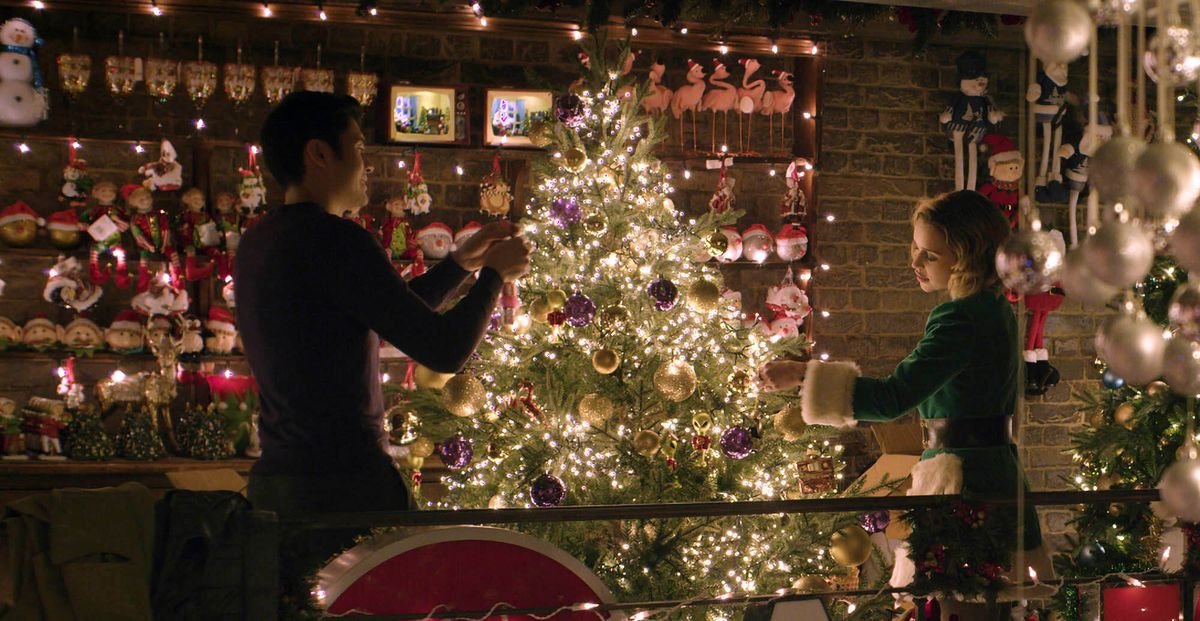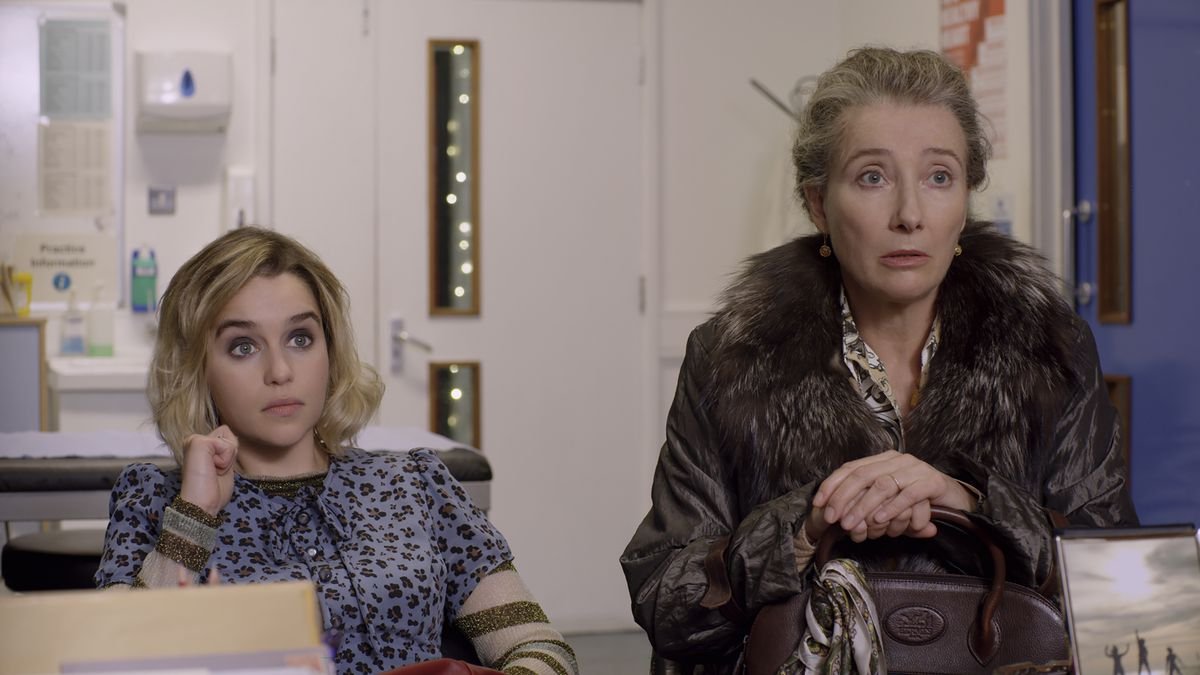Part of the appeal of romantic comedies is watching attractive people fall in love with each other. That’s the only real base requisite for the genre; a ticket ensures a little window of escapism into a world in which problems resolve neatly through the power of love. Last Christmas, directed by Paul Feig, with a story by Emma Thompson, her husband Greg Wise, and Bryony Kimmings, offers exactly that, as Emilia Clarke learns to embrace the Christmas spirit through her burgeoning relationship with Henry Golding. Beyond that, the film doesn’t offer much, apart from plot points introduced and abandoned in favor of the romance. But the level of charm present makes it difficult to begrudge.
Clarke plays Kate, a young woman working in a year-round Christmas shop. In the wake of a heart transplant, she’s become increasingly aimless and unsure how to continue her life after such a serious health scare. As she does her best to avoid her family’s concern, she stays with various friends, but her carelessness toward them (bringing strangers home, dropping a hair dryer into a fish task, wearing her shoes inside) means she’s running out of couches to surf on. Meanwhile, she’s also testing the patience of her boss, “Santa” (Michelle Yeoh).
Things start to turn around when Kate encounters Tom (Golding), whose relentless optimism and put-together-ness seem to make him her polar opposite. They get off to a rocky start, with Tom repeatedly needling Kate until she agrees to go for a walk with him. But the prickliness between them doesn’t last long. Soon, Kate’s waiting for a glimpse of Tom outside her Christmas-store window, eager for their next rendezvous. (He keeps his phone stowed away under the pretext that it distracts him from properly appreciating the world around him, which means their dates are relatively impromptu.)

A few side stories jockey to provide a sense of timeliness as Kate’s family (originally from Yugoslavia) and their neighbors deal with anti-immigrant sentiment stemming from Brexit, and Kate tries to distance herself from her heritage. She refuses to go by her given name, Katarina, and abhors the old lullabies her mother (Thompson, sporting an outsized accent that rivals Meryl Streep’s in Mary Poppins Returns) sings to try to help her sleep.
Another thread of the film focuses on a homeless shelter, which adds an extra dimension to Kate’s personality. As one of the employees there notes when she begins to take an interest in helping out, he’s seen his share of “middle-class do-gooders” come and go. But hints at further commentary on London’s homelessness problem (and police response) are shuttered in favor of simply of proving that Kate is more than a flighty dilettante. The film’s main attraction is Kate and Tom’s relationship, and all other details (like the subplots about Kate’s sister’s reluctance to come out to her parents, and Kate’s lack of sensitivity) are either rushed to conclusions or abandoned by the movie’s end.
Feig also seems to be mostly interested in Kate, which isn’t particularly surprising, given his track record producing female-led comedies like Bridesmaids, The Heat, and Spy. But the focus on her means even Tom ends up becoming a little wooden as Kate’s journey toward betterment requires a solo screen time.
As a result, Tom’s personality boils down to “charming hunk” and not much more, though Golding is a smart choice in both the “charming” and “hunky” categories. Clarke, whose eyebrows carry the bulk of the movie, has a little more room to show off her dramatic chops. Her performance is cartoonish — every reaction is outsized and overdramatic, hence the importance of her eyebrows — but the rom-com is frequently a cartoonish genre. (One of the best extended gags is Yeoh’s romance with a Danish man who comes into the shop. Whenever they see each other, they’re reduced to stunned, stammering messes who can’t take their eyes off of each other.)

As the movie’s title might suggest, George Michael’s music runs throughout Last Christmas. Kate, who has wanted to be a singer since childhood, is particularly fond of his music, playing it on repeat as she bounces around London. There’s no other real significance to Michael’s pop songs, other than a basis for the plot and a soundtrack that’s aimed at viewers’ nostalgia centers.
The music is just another way Last Christmas is a charm offensive, from its stars to its cameos (Rob Delaney, Peter Serafinowicz, Sue Perkins, Patti LuPone) to the fact that it’s set at Christmas, upping its already considerable schmaltz factor. There’s no real relevance to the holiday in the film, but the Christmas trappings and the holiday’s most sentimental aspects are more ammo to be fired off at viewers’ serotonin levels. It’s the filmic equivalent of a bad-to-mediocre cake being covered in beautiful frosting and decorations. It’s hard to resist, even for people who know better.
As far as rom-coms go, Last Christmas is a safe, straightforward bet. Feig doesn’t attempt any subversions of genre or gender expectations, à la Bridesmaids or Spy — Kate’s messiness is sometimes unappealing, which is rare for blockbuster heroines, but not for Feig’s characters. Even a major late-film twist isn’t enough to set the movie apart from other romantic comedies. But Last Christmas does the job when it comes to creating a pleasant haze of warm feelings, offering a momentary respite from the cold, cynical world outside the movie theater.
Last Christmas is in theaters now.
























































